Welcome to Making Makars the Scottish Poetry Library’s sharing space for teachers. Here you can share and find all sorts of poetry learning and teaching goodies.
Primary Poetry Pops: Andrew Fusek Peters
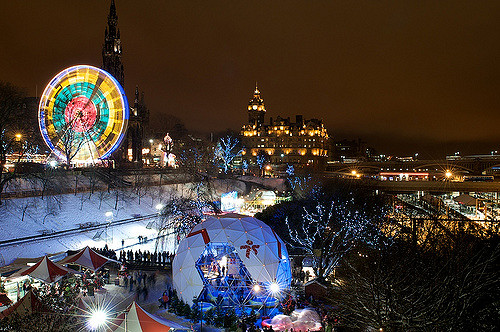
Edinburgh Winter Wonderland image by Alastair Cormack. Shared under a CC licence, available at http://www.flickr.com.
Welcome back Emma who has some seasonal poetry inspiration for us all.
As our cities presently burgeon with festive life, Andrew Fusek Peters’ wonderful poem Last Night, I Saw the City Breathing presents a myriad of seasonal possibilities for primary poetry writing. A multitude of man-made busyness allows for magical personification with a thoroughly Christmassy twist. Merry Christmas … and Enjoy!
Download resource-sheet-december-2016
Download pupil-worksheet-december-2016
Right, that’s me inspired and full of festive joy. I’m off now to make poems and mince pies! Thank you, Emma and Merry Christmas to all!
Primary Poetry Pops

We’re delighted to welcome back Emma Speedy who is writing a new series of learning resources for poetry teaching in primary schools.
Primary Poetry Pops are blog posts for teachers that hope to help flex some serious creative muscle in primary-aged poets and to inspire some courageous and original poetry.
Why Pops? A bit like a good lollipop, it hopes to be colourful and instantly delicious… And of course poetry should definitely pop not plod! Writing poetry shouldn’t have to be a lengthy process. Delve in and choose a sparky activity that will reap instant explosive results!
*******
October is upon us. There lurks the possibility of creatures and monsters and spooks of the dark. Billy Collins’ poem Budapest shown here, in written and animated form, offers us an alternative monster in the form of a pen. We all have them, nestling in the depths of our charcoaly pencil-cases. Awaiting release. What can this creature want, as he scurries amongst a desk of loose paper?
These activities would be well-suited for a creative P4 group and upwards.
Download Emma’s resource-sheet-october-2016.
Download the clothes-worksheet-october-2016.
Download the creature-worksheet-october-2016
Download the the-pen-creature-october-2016
Thanks, Emma for that Halloween-friendly fun! Looking forward to your November post already…
Messages from Kirkintilloch!
Karyn Don, librarian at Kirkintilloch High School got in touch to tell us how their school celebrated National Poetry Day by displaying staff members’ favourite poetry or song lyrics. Also S1 pupils entered a library competition to compile poems about MESSAGES. Here are the winning entries:
Many congratulations to Ryan, Jon, Leah and Jamie! And many thanks to Ms Don for sharing her students’ work. If you’ve got poems from National Poetry Day that you’d like to share with us, get in touch at georgi.gill@spl.org.uk
View from the Book Festival 3
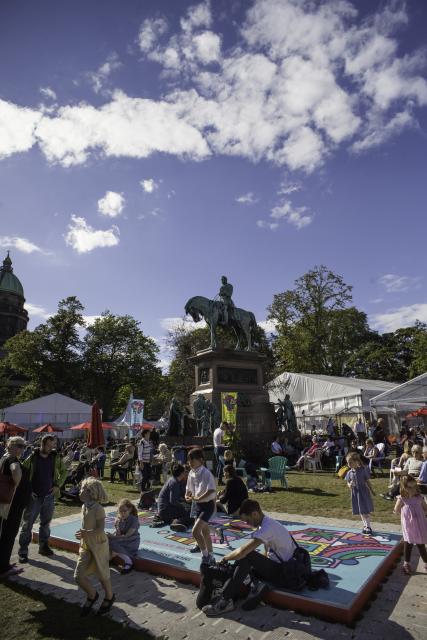
Charlotte Square Gardens 2016, (c) Robin Mair, Edinburgh International Book Festival
An unexpected and unlikely combination of sounds and faces was brought together under the diverse canopy of the Edwin Morgan Poetry Award 2016 at this year’s book festival. From reductionist poems on pornographic legislation to reminiscent tales of childhood memories, this eclectic mix of genres and styles was incredibly refreshing- a great nod to the forward thinking approach Morgan himself had.
Throughout the week I spent at the book festival, it soon became apparent how opened minded the atmosphere was and how welcoming everyone was to new faces and new ideas. This event perfectly encapsulated this spirit, introducing new poets and showcasing them to a warm and inviting audience- the camaraderie completely undermined any competitive tensions. The talent that Jackie Kay and Stewart Conn spotted was a wonderful surprise to the audience, coming from such young poets (30yo and younger), and the judges themselves confessed to being astounded with the skill and innovation with which all of the top 6 poets wrote. I fully recommend looking up said poets, as they no doubt will help to shape our literary future. The shortlisted poets were Claire Askew, Stewart Sanderson, Sophie Collins, Harry Giles, Miriam Nash- the runner-up and Penny Boxall, the overall winner.
Hearing this homegrown talent was incredibly inspiring, especially as a young poet myself, and I wonder what it was that inspired each of them to pursue this prestigious award. Perhaps it was encouragement from friends, the opportunity to have feedback from two such accomplished poets, or maybe it was the experience of seeing fellow young poets stepping forward and taking to the stage at such a well-established festival. I look forward to hearing their names crop up in the future, and I have no doubt I’ll come across them whilst flicking through the Book Festival programme in a few years time.
View from the Book Festival: 2
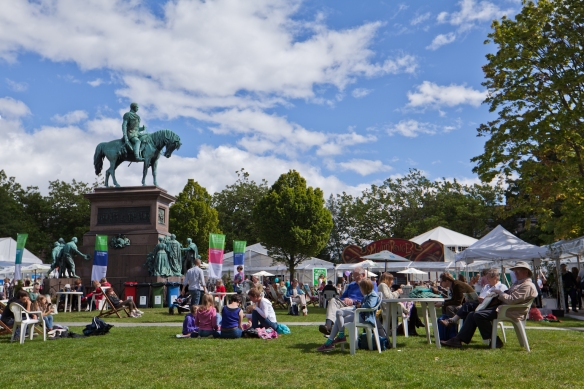
Image courtesy of Edinburgh International Book Festival
Hot on the heels of yesterday’s post, our Youth Reader in Residence, Mikaela, is back with a review of ‘Gloss’ an event which incorporated poetry (sign language and word) and dance.
Gloss: A performance, Wednesday, 17th August
The world premiere of Gloss opened in silence. Funded by Blue Metropolis, this innovative project combines sign language, word poetry, and dance to express the fluidity between speech and movement. This abstract audiovisual art piece was created by three Canadian poets, Tanya Evanson, Kaie Kellough and Pamela E Witcher, all of whom took part in the performance, moving effortlessly between mediums.
Witcher began her performance in sign language, her repetitive motions carrying varying weight and meaning to each person in the audience, depending on whether they understood American Sign Language. I found it a challenge to follow, not knowing sign language, and so relied instead upon her expression, which moved from calm to panicked to confused.
After a slow start, the pace of the performance gradually tightened and ebbed, flowing in wave-like rhythms, while the clarity of speech was at times deliberately fragmented and incomprehensible, depending on the volume of white noise which constantly played in the background.
Although often hard to make sense of and rationalise, Gloss conveyed a true sense of angst and emotional turmoil and managed to capture the struggles faced by the deaf when communicating. Closing the show, Evanson said, ‘I hope we have made you feel something’; if the captivated faces in the audience was anything to go by, it is clear that the performance succeeded.
If you missed Mikaela’s first three reviews from the Edinburgh International Book Festival, fear not! You can catch up here. More to follow soon…
View from the Book Festival: 1
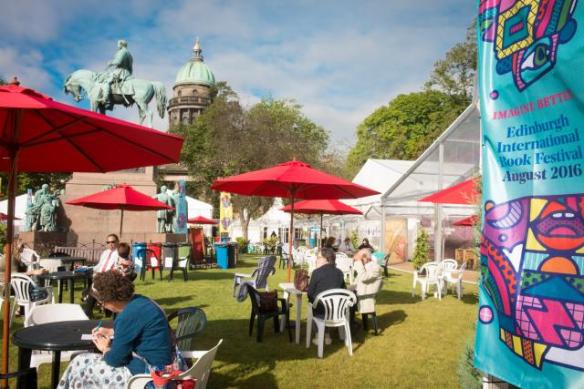
Edinburgh International Book Festival 2016, Alan McCredie Photography/EIBF
Making Makars is delighted to welcome our latest guest blogger, Mikaela, who is the current Youth Reader in Residence at the Scottish Poetry Library. Mikaela studies here in Edinburgh and is a shortlisted Foyle Young Poet so we knew that when we sent her off to the Edinburgh International Book Festival to view and review events for us, she’d come back with something great.
Today, in the first in a series of posts, Mikaela reviews the first three events that have caught her eye.
Claire Askew and Helen Mort, Saturday 13th August
Who better to address the session’s theme of ‘Outspoken Women’ than two of our most talented young poets, Claire Askew and Helen Mort. Each addressed the theme through the lens of their own lives and experiences. They read a selection of poems, followed by a Q&A prompting further discussion on the topic, specifically what it is that draws them to writing about difficult women.
Helen Mort focused on the role of women in the male dominated sport of climbing and the attitudes of men towards them; being a climber herself she spoke largely from experience. Claire Askew surprised the audience with the title of one of her poems: ‘I’m sorry I’m still in love with my Grandmother’, a tribute to an inspiring woman in her life.
This confident and frequently funny duo inspired the audience to think again about overlooked women in history and in their own lives.
Zaffar Kunial with Jackie Kay, Monday 15th August
Zaffar Kunial – who is half-Pakistani – and Jackie Kay – half-Nigerian – explored the feeling of ‘being mixed’ in a society which is becoming increasingly hostile towards ‘foreigners’. They spoek of the feeling of shame that comes with not quite fitting in to either camp and of the journey of discovery they’d gone on, one where they learned to accept their heritage. As an illustration, Kay read her poem ‘Between the Dee and the Don’, which captures this sense of growth and affirmation, turning sentiments that can be a source of reproach into a proud and defiant statement instead.
The theme of being ‘in between’ was not only explored in terms of ethnicity and culture but also in through the question of what it means to be an author; a writer exists in a state between what they’ve written and an audience who will read their work, acting like a Hermes-type messenger bringing literary ideas to life.
One of the most powerful and moving of the poems read throughout the event was Kunial’s ‘Half-cast’, which closed the evening. This looked at the relationship between reader and writer but simultaneously left the audience with a heightened awareness of the importance of identity, the extent to which it informs everything we do.
Agnes Török and Chimwemwe Undi, Tuesday, 16th August
The air crackled with anticipation as Agnes Török and Chimwemwe Undi stepped up onto the stage. Introduced by Michael Pedersen, Török took to the lectern first. She spoke about happiness, the theme of her book Happiness is an Art Form, which discusses its commercial value, and the relationship between political systems and happiness. She also performed poems, amongst them ‘Worthless’, a recording of which went viral when uploaded to YouTube; it made her an internet sensation, but also a target of death threats.
Török’s performance perfectly set the tone for Undi, who was somewhat quieter but whose voice was just as compelling. She spoke about what it means to be a black woman in North America, an experience shaped by having had ancestors who lived under the Apartheid regime in South Africa. She cut through the hush left by Török with her poem ‘Ex-Caucasia’, which takes on the killing of black people and the excuses and victim-blaming which consequently ensue. The audience responded to both poets with tears and laughter. A definite highlight of the Book Festival so far.
There’ll be more posts coming up in this series so check back later this week for more highlights from the EIBF… Thank you , Mikaela!
Mother Tongue Other Tongue
Today Claire Mackay, an EAL teacher at St Andrew’s Learning Community shares some poems with us written by her primary pupils. These students are so talented that they have written their poems in two languages!
This year, children from schools in the east end of Glasgow took part in a bilingual poetry contest; Mother Tongue Other Tongue. MTOT is an exciting multilingual poetry project which celebrates linguistic and cultural diversity through creative writing, and showcases the many languages which are spoken and learned by young people in school and at home.
Mother Tongue encourages children, who do not speak English as a first language, to share a lullaby, poem, rap, song or original from their mother tongue and to write a short commentary in English about why this piece is important to them.
We are currently in the process of making all the children’s work into a book. Here are some of the original pieces written by some of our talented children.
Minions are small.
Minions are small and yellow.
Minions are small, yellow, and silly.
Minions are small, yellow, silly and playful.
Minions are small, yellow, silly, playful and loyal.
Despicable.
By By Brandon (Aloic) Ngassa.
I wrote my poem about Minions because the movie ‘Minions’ is my favourite movie. It is a funny and silly movie and it makes me happy. I wish I had a minion. I would play with it and teach it how to speak English and French, like me. My poem is an adjective poem. I learnt to write this kind of poem in school when I worked with Miss Mackay and other children.
When I read my poem it makes me think about my brother, Jordan, because he is funny, silly and playful. He is good at telling jokes and when I go to bed and try to sleep, he jumps up and scares me! We both roll about laughing!
Aloic’s poem in French:
Minions sont de petite taille.
Minions sont petites et jaunes.
Minions sont petites, jaunes , et stupide.
Minions sont petites, jaunes , idiot et ludique.
Minions sont petites, jaunes , idiot, ludique et loyal.
Méprisable.
And now a poem in English and Finnish by Feba Agbomeirele
Football is extraordinary.
Football is extraordinary and emotional.
Football is extraordinary, emotional and fascinating.
Football is extraordinary, emotional, fascinating and respectful.
Football is extraordinary, emotional, fascinating, respectful and active.
Skilful.
Jalkapallo on poikkeuksellista.
Jalkapallo on satunnaisia ja emotionaalinen .
Jalkapallo on ylimääräinen , emotionaalinen ja kiehtovaa .
Jalkapallo on ylimääräinen , emotionaalinen , kiehtova ja kunnioittava .
Jalkapallo on ylimääräinen , emotionaalinen , kiehtova , kunnioittava ja aktiivinen .
Taitavaksi.
Feba says: ‘I chose to write a poem about football because it is favourite sport. I used an adjective poem. My favourite part about my poem is football is emotional because it really is, especially when you lose or win, like a world cup. When I’m older I would like to be a famous footballer. I play for my school team at the moment. I am the left back.
I loved coming to Mother Tongue, Other Tongue project. It helped me learn my language a little bit more. Four months ago, I visited family in Finland and they taught me words and I used them in the competition. I would like to take part in the competition again!’
Our last poem today is from Mykel who has written in Tagalog:
Si Baxie ang aking kaibigan
Ako ay asong maliksi
Ang pangalan ay baxie
Sa aking pag pasok sa eskawela
Sya ay lagging kasama
sag mag hapong paghihintay
sa bintana sya naka bantay
at sa aking pag babalik
sya ay nanabik
sa muling pagkakita
nanunumbalik ang single
ng aking kaibigan na alarm kong di ako iwan
In case you don’t understand Tagalog, Mykel says this about his poem: ‘This poem is about my dog, Baxie and how he reacts to when we leave the house and when we come back.
He is really quick at running, because he always looks out the window in the living room. Sometimes when he hears a voice he also runs to the front door to greet us, and then he wags his tail. My mum bakes and my mum is teaching me make breads like – “pandasal”, she also cooks. If my dog is very good, he might get some of the dish, even the bone.
I wrote this poem with my mum, she was a very big help with translating it to Tagalog. Tagalog is like squeezing Portuguese and Spanish together. I think it is very simple to learn, however my mum and dad are very busy. I know the words, but I can’t speak it.
I do a lot with my mum, like just now we are making a carpet. My mum plaits t-shirts, then we have to spiral it around. Then we are going to put it in my room. I also decorate with my mum for parties. My mum isn’t very well just now, but she still likes to help me. I love her.’
With many thanks to Claire for sharing the children’s poems and huge congratulations to Aloic, Feba and Mykel – three immensely talented and articulate young people!
All about the new Makar!
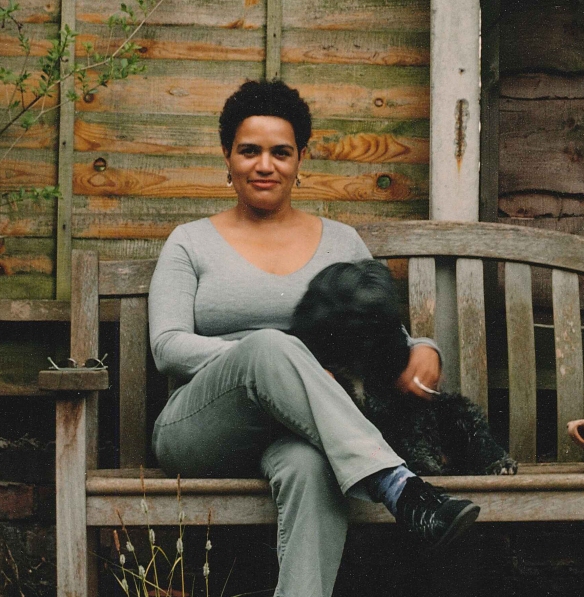
Image of Jackie Kay by Amanda Nordgren
Welcome back to Chiara, our youth reader in residence who has come back refreshed from her Easter holidays with the lowdown on new Scottish Makar, Jackie Kay.
Jackie Kay has been awarded the role of Scotland’s newest Makar.
So what is a Makar?
The role of Makar was created in February 2004 by the Scottish Executive. Edwin Morgan was to hold the post for three years, but the award was extended as a lifetime appointment due to the skill of his poetry. When Edwin Morgan died, the post of Makar continued with the condition that each poet who became Scottish Makar would hold the post for five years at which point a new poet would be elected to take over the role. The award recognises the achievement of Scottish poets and makes people more aware of the quality of poetry that Scotland has.
Who is Jackie Kay?
Jackie Kay has written five collections of poetry for adults yet, she also writes fiction, poetry and plays. She puts lots of her feelings and stories of her past into her poems which can make readers relate to her. Jackie Kay. Jackie was born in Edinburgh and adopted in 1961. Her biological father was Nigerian and her biological mother was from Edinburgh. Her birth mother, Elizabeth Fraser was 19 years old when she gave birth to Jackie and she was forced to have her baby adopted. This may be due to the baby’s father being a black man or because she was very young. Kay’s birth father, Jonathan Orlando, was a graduate student from Nigeria. She was adopted by a white communist couple, Helen and John Kay.
What sort of poetry does Jackie Kay write?
She has written a lot about how she felt living in Scotland as a black child and about the experience of being adopted.Her first book of poetry, The Adoption Papers, explores her different heritages. There are three narrators: an adoptive mother, a birth mother and a daughter. The Adoption Papers won the Scottish Arts Council Book of the Year and a commendation from the Forward Poetry Prize judges. Jackie Kay carried on writing poetry and decided that she wanted to find her biological parents. Her partner at the time, poet, Carol Ann Duffy helped her in this search. Jackie met her mother which was apparently strange at first, but after a while they got on. However, she also managed to track down her father which didn’t go as well because her father struggled to accept his daughter’s sexuality and atheism.
Jackie Kay writes about the discrimination she received, her adoptive and biological parents, racism in society, love and her breakups. This is more appealing to readers of poetry as it addresses issues that we have in society today. Many people relate poetry to the ‘olden days’ however Jackie’s poetry is new and modern.
Any recommendations?
jackie Kay’s most famous books are The Adoption Papers, Trumpet, Red Dust Road, Reality Reality but there are many more worth checking out.
Secrets of the Library
Welcome back to Chiara, our Youth Reader in Residence, who has been spending time getting to know some of the SPL’s most treasured items.
In 2011 an anonymous artist decided to meddle with many of Scotland’s book lovers. She made ten book sculptures and placed them in specific locations around Edinburgh. Three of the sculptures are currently in the Scottish Poetry Library. These mythical objects are made out of famous books and famous lines from poems and books.
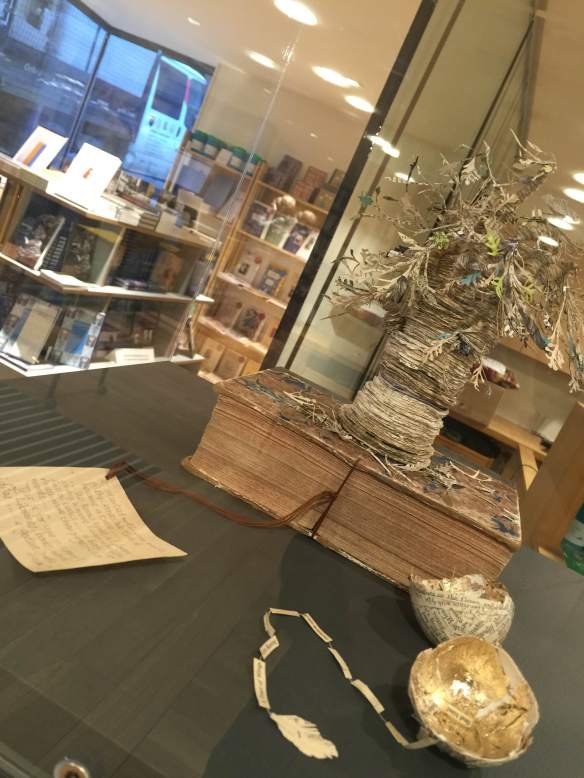
The Poetree at the Scottish Poetree Library!
One of the three book sculptures which is in the Scottish Poetry Library is a dainty little tree, called the ‘Poetree’. It was found on Tuesday 2 March 2011, on a table here, in the Scottish Poetry Library. The book sculpture looks like the typical old tree you would find in a fable. It has dainty leaves with thin branches. The tree is resting on an old, thick leather book. At the base of the tree there rests a broken paper egg. The egg is cracked in half, inside of the paper egg shell, it is gold and contains an array of words.
The words come from the poem “A Trace of Wings” by Edwin Morgan. Attached to the sculpture there is a little parcel tag which is addressed to the Scottish Poetry Library’s twitter account.The note on the tag read: “It started with your name @byleaveswelive and became a tree.… … We know that a library is so much more than a building full of books… a book is so much more than pages full of words.… This is for you in support of libraries, books, words, ideas….. a gesture (poetic maybe?)”
The BBC interviewed the book sculptor and asked her why she had made them. She stated “The first book sculpture, a little tree for The Scottish Poetry Library, was made primarily as a response to library closures and cutbacks.” Clearly for the anonymous sculptor, it is essential for people to realise that libraries hold an important role in our society. Although, as she told the BBC, after the first book sculpture she decided to make more as it was ‘fun’.
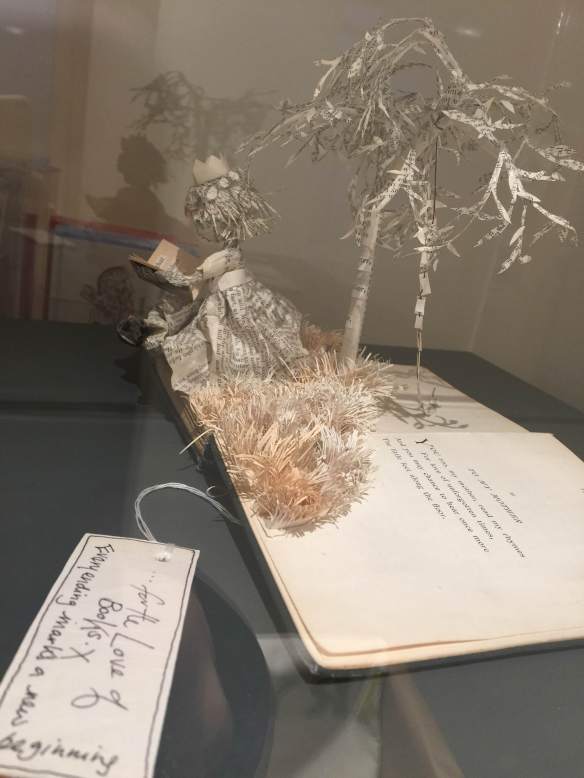
Even the sculptures read at the SPL!
In 2012 the second book sculpture arrived in the Scottish Poetry Library. This sculpture is my personal favourite and is built on Robert Louis Stevenson’s A Child’s Garden of Verses. On top of the book a girl sits under a tree wearing a crown. She is reading a little paper book which has written; “queen” and on the trunk of the tree it reads; “Were hunter, soldier, tar” Inside the book the girl with the crown reads, it says; “ “And all the thousand things that children are”. These quotes originate from the poem ‘To Willie and Henrietta’ by Robert Louis Stevenson. It reminds me of Anne of Green Gables – another classic book.
The third book sculpture in the Scottish Poetry Library is a special and mysterious one. It is so special that it is not on general display. If you really want to see the book sculpture then you must pay a visit to the Scottish Poetry Library…
Light-headed poems
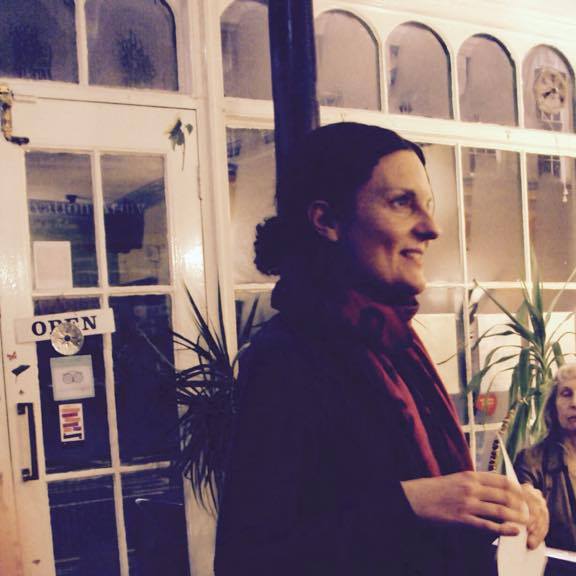
Catherine Ayres – poet, teacher and workshop extraordinaire
I’m thrilled to welcome today’s guest blogger, Catherine Ayres. I’ll let Catherine introduce herself…
My name is Catherine Ayres. I write poetry and I also teach English to Year 7 and 8 pupils at St. Paul’s Middle School, a small school in rural north Northumberland. I run a creative writing club after school on Monday nights. It’s a small but lively group of about eight kids, and we have a lot of fun! I run each session as a workshop and we usually have a loose theme every half term. We try to produce an anthology of writing at the end of each period, which is distributed amid much excitement to the rest of the school.
Last autumn we decided to work on National Poetry Day’s theme of light, after being inspired by the beautiful poem posters created by the SPL. We read and discussed the poems and then I used the Forward Arts Foundation’s excellent ‘Light’ teaching resources during workshops in the autumn term. There are five lessons in the resource pack – Lies about Light, Images and Illuminating Characters, Glow, Hallelujah and Transformation – produced by different poets for organisations around the country and brought together in one pack by Forward.
I started each session with warm up activities, many of which I learned from the wonderful poet Lisa Matthews when I attended one of her Strange Bedfellows evening courses (more information about Lisa and her work can be found at www.literalfish.dunked.com ).The children really loved the Surrealist ‘Exquisite Corpse’ exercise. It helped them to be more adventurous with their imagery and some of them really revelled in a new found freedom to write from the outer edges of their imaginations.
The pupils’ favourite activity was Images and Illuminating Characters, which involved responding to art, including Van Gogh’s Starry Night, Edward Hopper’s Nighthawks and French cave art. They also loved reading poems by Lisa Clarkson and Nat Norland, two young poets featured on the Poetry Society website.
The pupils produced 13 poems for a ‘Light-headed’ anthology at the end of term. It was very hard to choose three poems from the anthology but these three stood out (and I was amazed when Tamsin presented me with a specular poem after a discussion about ancient myths surrounding the blood moon. She didn’t realise that mirror poems are quite hard to write, but she knows that I love them).
Here are some of the fantastic poems by Catherine’s students. Thank you, Catherine for such an illuminating blog! (Illuminating, geddit?) And well done to Libby, Philipa and Tamsin for their great poems.
Please Don’t Blow Me Out
I can dance for you
Spark and reach and flicker
My movements reflect on your walls
My special magic display
I can dance into your soul
Carve happiness on its walls
Please don’t blow me out.
I am weak and small
I burn only to die
I show you things you didn’t want to see
Secrets of the dark
I show you shadows
I’m scared of wind and rain
Please don’t blow me out.
I give you a path
A path of golden light
I am good and strong
I read the darkness
I translate its stories
I watch the Sun and Moon
Great gods sewn in the sky by stars
But time melts my wax
I will die.
Libby Payne, 12
Moon
Washed up on an evening tide,
vexed in confusion,
she tiptoes around the sky.
Constellations become crossed
into intricate patterns and shapes.
She wonders why she was given the job
of an artist if no one notices the art?
Wordlessly she waits,
thinking about the cruel destiny she was given.
Slowly she trudges towards the doorway,
droplets crawling down her face;
it beams with ghostly sadness.
She feels useless
but she isn’t.
Maybe tomorrow she’ll realise
but for now she crawls away.
Philippa Musgrave-Asher, 12
Blood moon
Red
is the moon.
Why?
The devil’s word
does not influence
that blood colour.
The moon’s wife
is not the reason for
that blood colour.
The jaguar
is not the answer to
that blood colour.
It comes,
it disappears,
it comes.
Wherever you are,
the blood colour gets into your head.
The blood colour gets into your head.
Wherever you are,
it comes,
it disappears,
it comes.
That blood colour gets inside your head.
The blood colour gets inside your head
Wherever you are,
it comes,
it disappears,
it comes.
That blood colour
is not the answer to
the jaguar.
That blood colour
is not the reason for
the moon’s wife.
That blood colour
does not influence
the devil’s word.
Why
is the moon
red?
Tamsin Keeney, 12




